I was incredibly saddened today to hear that Norman Bodek passed away yesterday in Japan, where he had recently moved with his wife, Noriko.
Norman was 88.
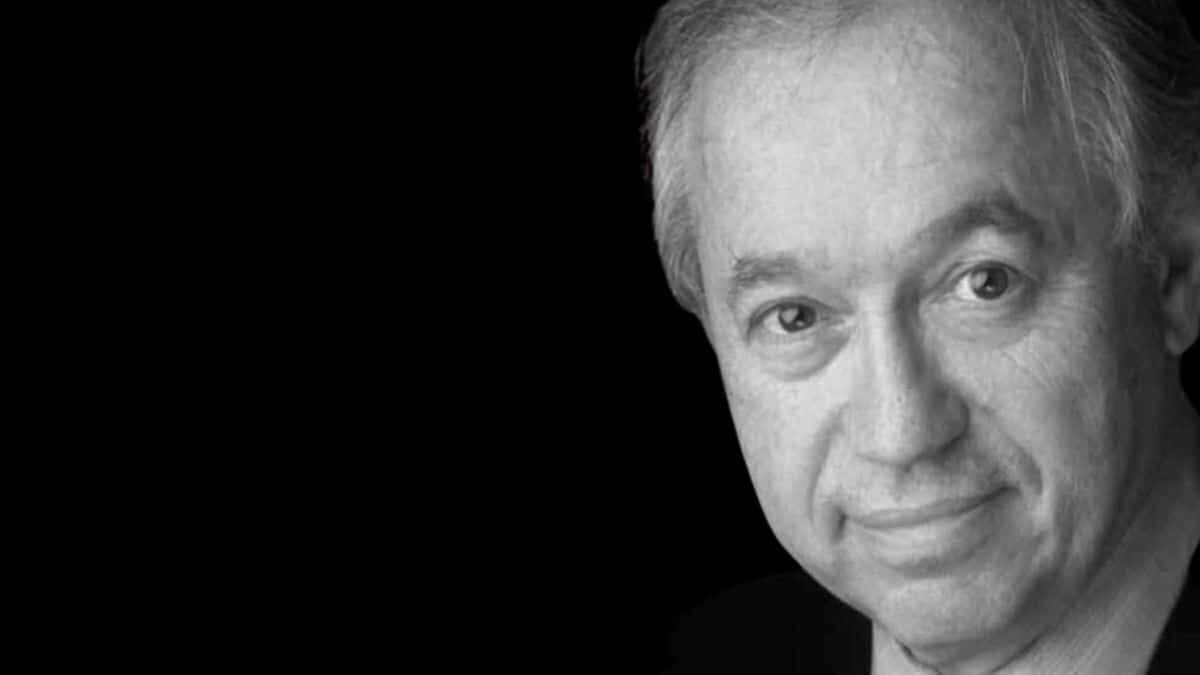
This was announced through an email from Norman's company, PCS Press, and I had previously seen it announced by a few people on LinkedIn. Here is his obituary.
Part of that email reads:
Dear Friends,
With great sadness, we would like to inform you that Norman Bodek, “the Godfather of Lean” passed away at this home in Japan due to heart failure last night.
Norman Bodek, famed as “the Godfather of Lean”, inducted into Industry Week's and American Manufacturing's Hall of Fame, published over 250 management books, taught at Portland State University, and created the Shingo Prize at Utah State University. He recently wrote “Leader's guide for social responsibility” and this week published CEO Coaching by Kazuyoshi Hisano.
Norman was kind and sharing all his life and until his last breath. He was working on a manual for leaders for transforming their organisations using the principles of social responsibility. He was excited about giving a mini-workshop next week for business leaders on this topic.”
We should all be so fortunate as to be as energetic as Norman was in his 80s. He was an enthusiastic teacher and mentor, but he also had a hunger for learning that was impressive and inspiring.
W. Edwards Deming famously worked right up until his passing at age 90 and Norman followed in his footsteps. One story about Norman says that he talked to Dr. Deming around him writing a book that Norman would publish. Dr. Deming supposedly scoffed at the idea of writing a book, and then later did so :-)
Norman had a gift for working with (and publishing the books) of Lean legends like Taiichi Ohno and Shigeo Shingo. He later introduced another Japanese consultant Takashi Harada to many people around the world.
From the PCS Press email:
“Just a few hours before he passed away, he was discussing with his colleagues how he could fix the broken healthcare system so that everyone receives the best care everywhere.”
I had similar conversations with Norman. He was appalled by the number of people who are killed by medical errors around the world and he wanted to work with executives to figure out how to create better conditions for healthcare professionals and better outcomes for patients. He cared deeply about this issue, for sure.
I want to express my deepest condolence to Norman's wife, family, friends, and colleagues around the world. It's a loss that I will mourn…
Some of My Experiences With Norman
I was racking my brain earlier trying to remember how I met or got introduced to Norm. Digging through email history, I think he reached out to me in 2005 because I had mentioned one of his books on my blog in the very early day of it that year. He offered to send me a copy, which was very nice of him.
In November of 2005, Norm saw that I had published an email/text interview with Jim Womack and Norm said, “Consider doing a series with me.” I did:
Norm later had a great idea — he suggested that we record an “audio interview” and that sparked my translation of that idea… starting my Lean podcast in mid-2006.
More specifically, he suggested this:
“I would like to try something new, a voice, radio, an interview on the internet. I thought you might be interested in doing it with me. Once a month to start, maybe once a week when we get experienced, you could interview me alone or with a Lean friend to talk about a specific, challenging, topic. You could then post this on your web site and also plug it into the business radio marketplace.”
I replied:
“Having done a bit of research, one option might be the idea of “podcasting”. I'm not sure if you are familiar with this term or not. It is basically an audio program that could be hosted for download on the Apple iTunes music store, as well as on my blog.”
So, he was my first guest and he was a frequent guest over the years.
I enjoyed listening to that first podcast yesterday while going for a walk. Norman had a lot of great insights. I thought, “Wow the audio quality is really bad.” I've made many Kaizens over the years. We might have recorded that first one with me using a laptop (with a bad microphone) to connect to Skype with him patching in via phone.
You can find other episodes with Norman here.
Although our last podcast was in 2013, about “The Harada Method,” I talked to Norm often, the last time being a few months ago.
Speaking of Harada, I was happy to see Norman mentioned in a Wall St. Journal article about Harada and and the Japanese baseball player Shohei Otani, as I blogged about:
I'm also going to listen again to this episode where he shared memories of Taiichi Ohno:
Maybe somebody, some young podcaster will interview me about memories of Norman.
And there are many more.
Going back further, in 2008 or so, the ValuMetrix Services consulting group that I worked for brought Norm in to give a speech to one of our annual healthcare client conferences.
I found the brochure PDF in my email archive:
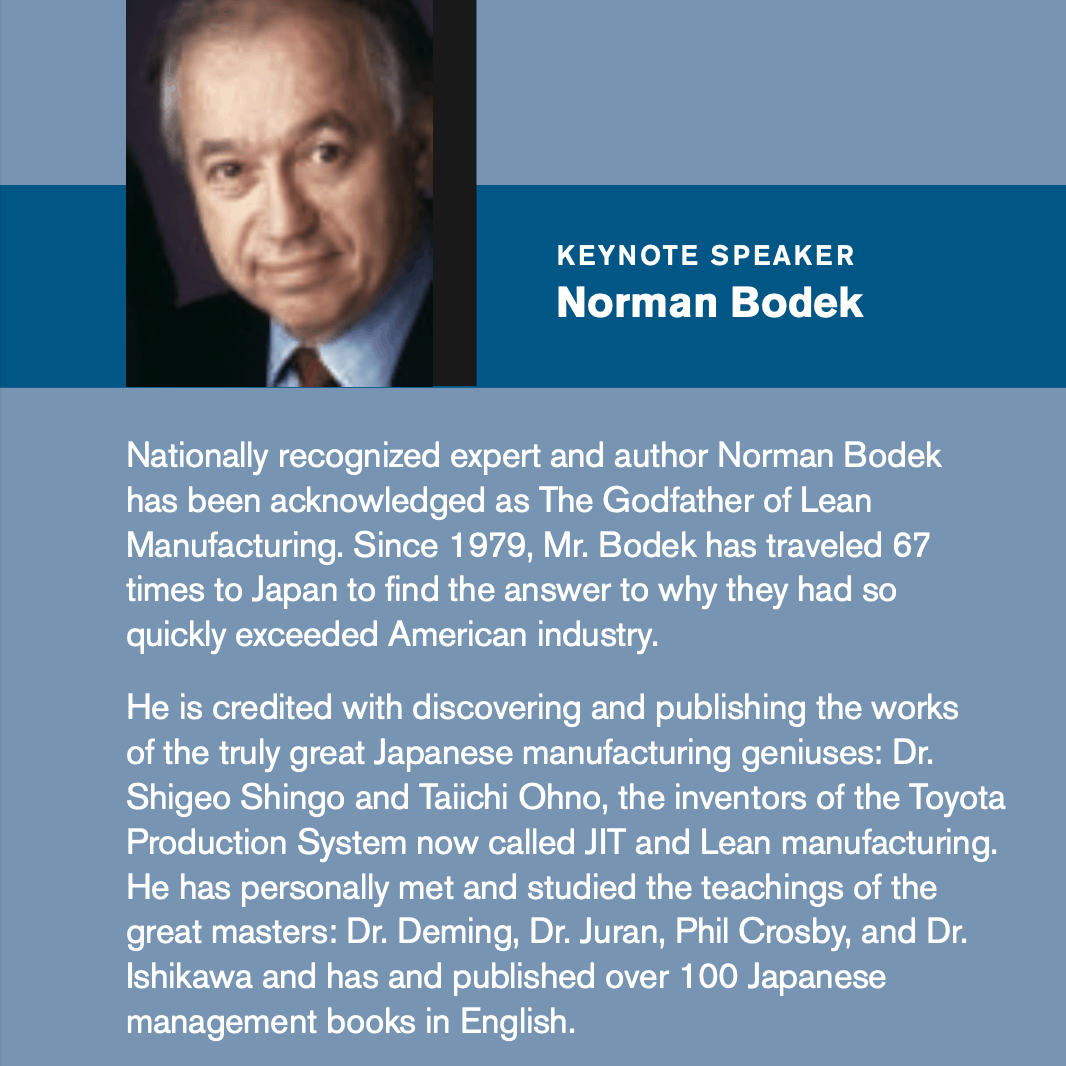
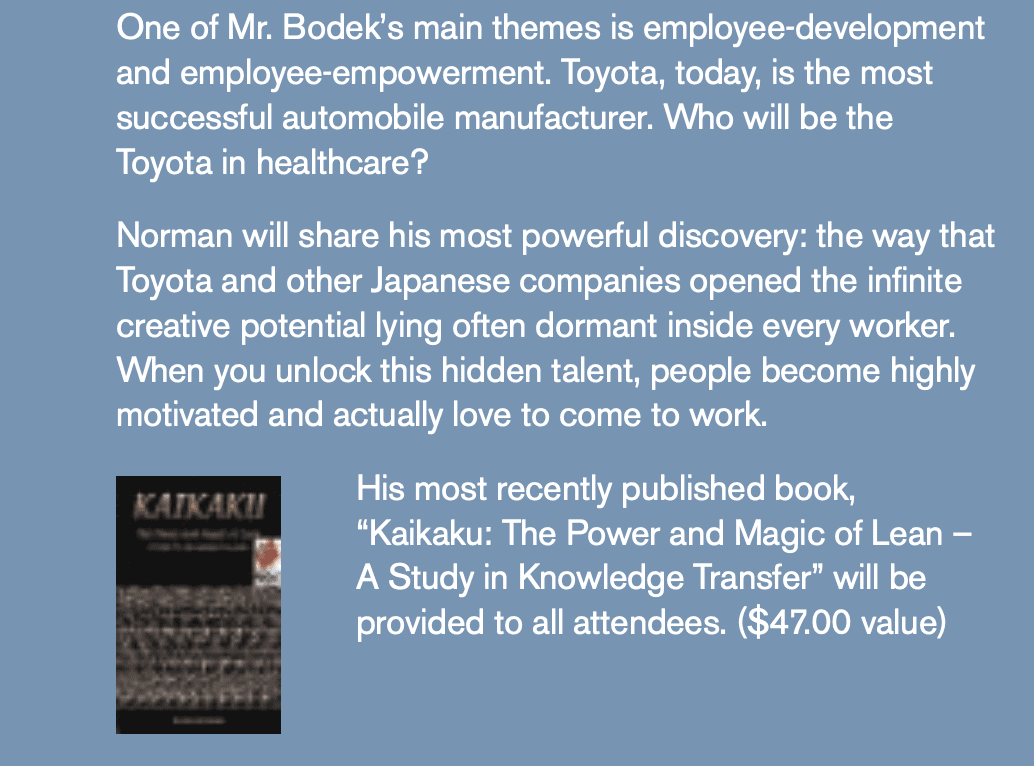
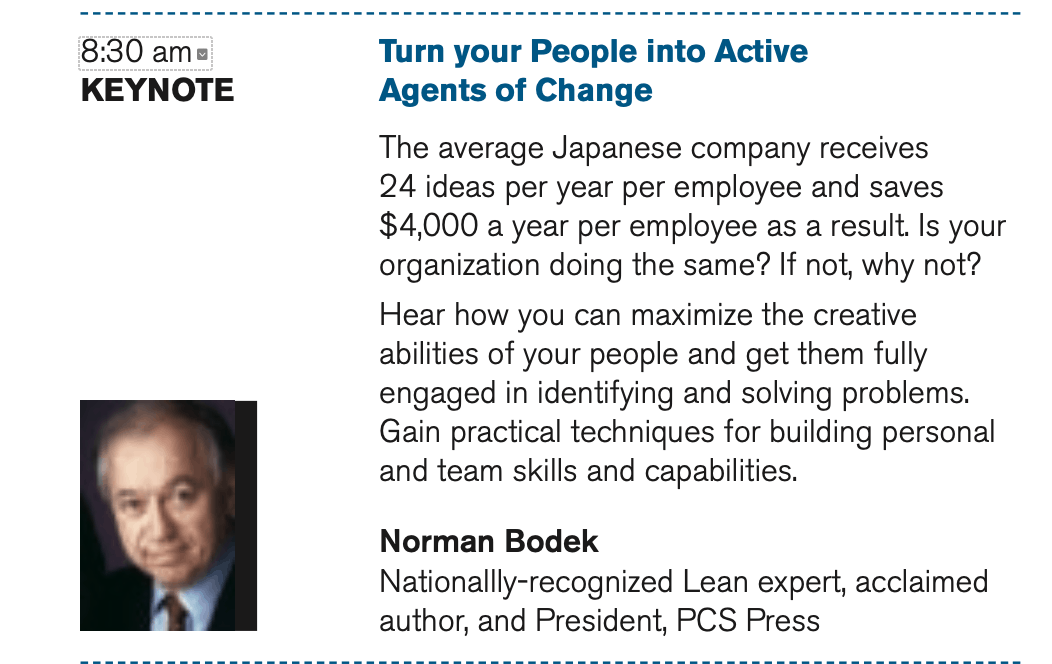
Here is a photo of us at that event:
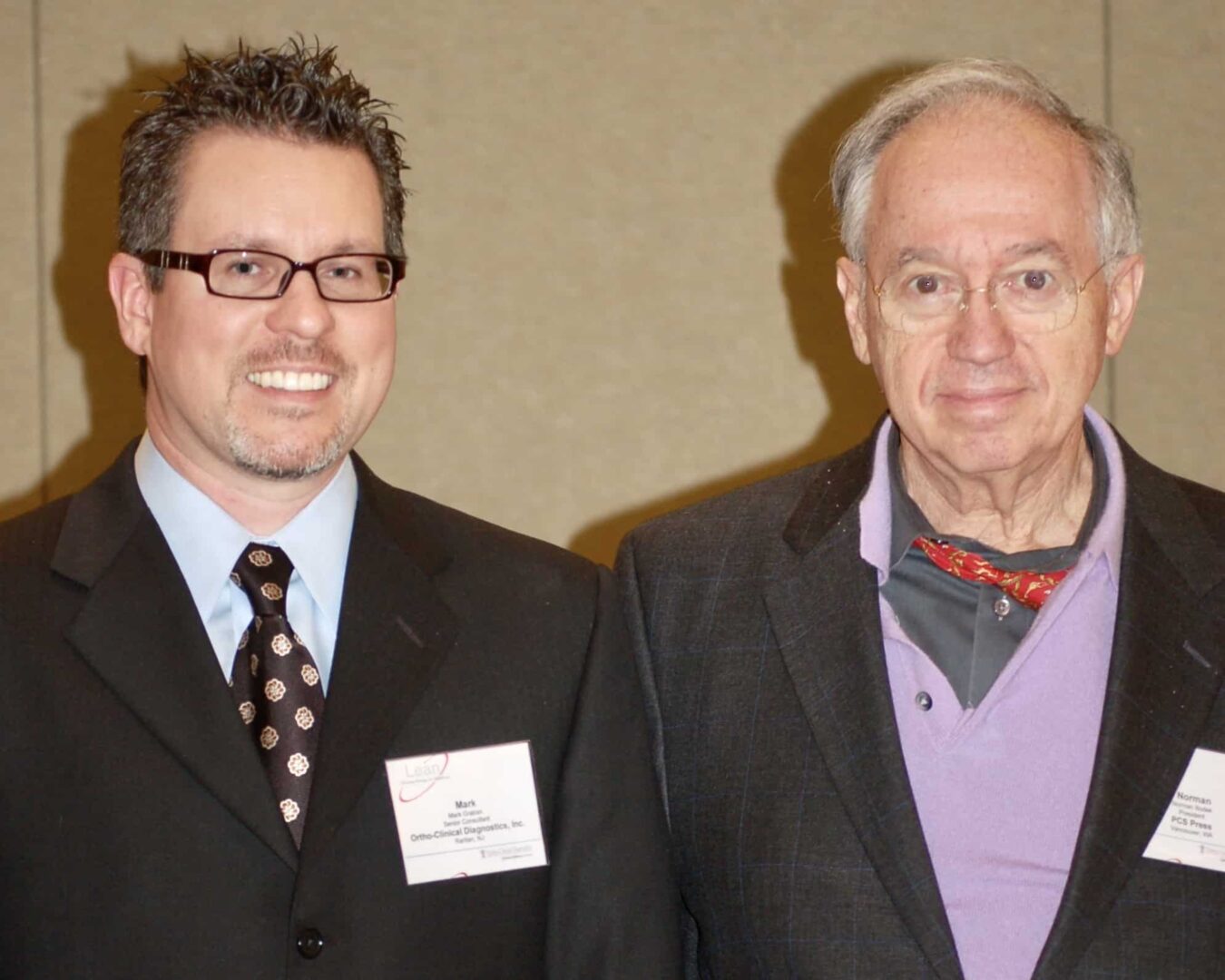
After that, he convinced my boss to send me to get two days of master class training with him. I was in his home, in his living room or his office, for two days, soaking in what I could and getting his coaching on my attempts to teach back what he had taught me. I have a lot of video from those two days that he allowed me to shoot, which I haven't revisited in a long time.
Norman later graciously agreed to write the introduction to the book Healthcare Kaizen, which I co-authored with Joe Swartz. Joe and Norm both had opportunities to work together, as Norm had been invited to come speak at Franciscan St. Francis Health about Kaizen. Norm was very instrumental in their Kaizen process and culture getting up and running, as we talk about in the book.
Here we are at the Shingo Conference in 2009:
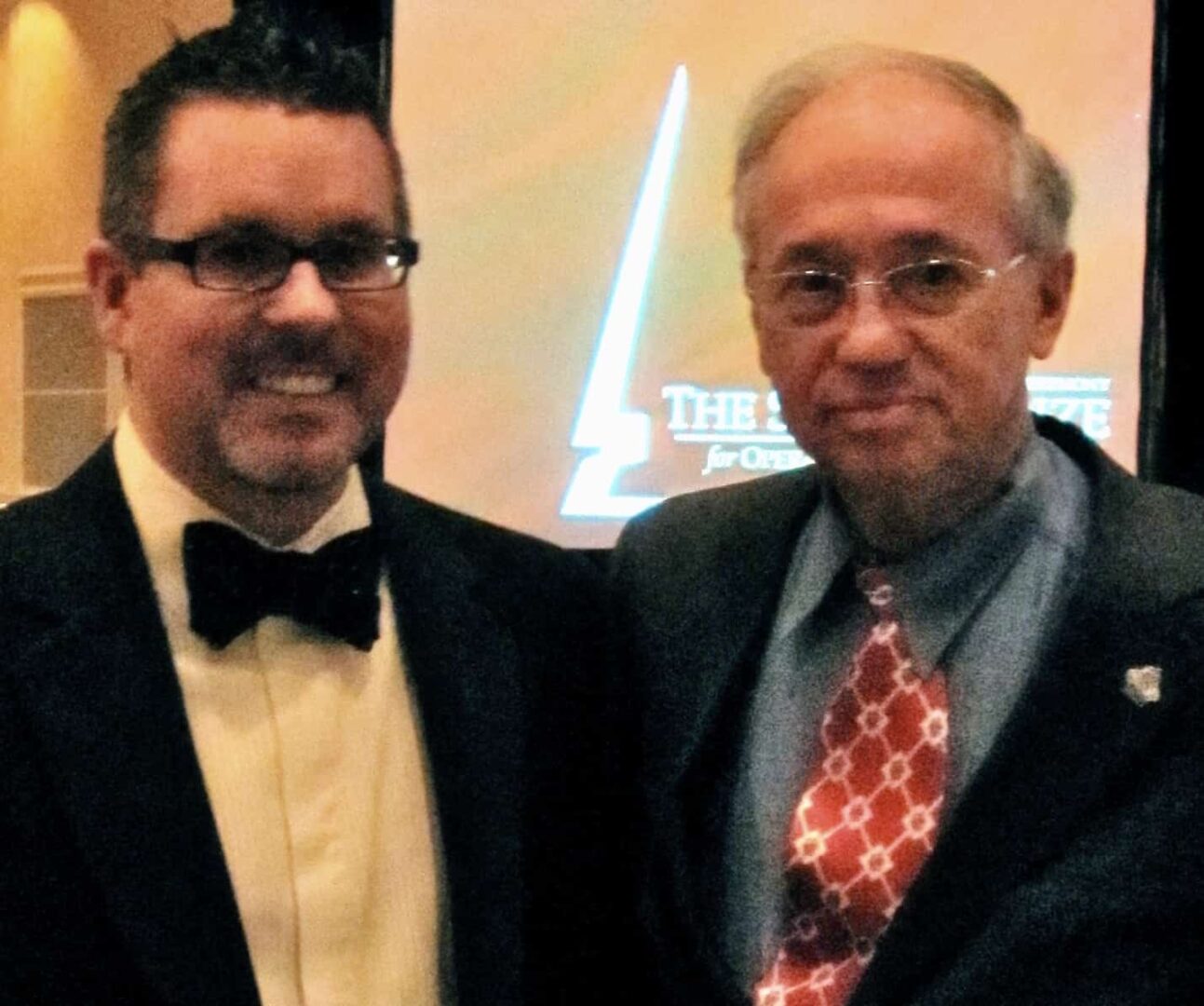
Norman's Intro to Our Book
Here is the intro, as it stood when we originally submitted it to the publisher, before any editing (with the emphasis toward the end added by me).
“In healthcare, enormous investments are made in things like buildings, technology, and pharmaceutical development, but little is spent to tap into the creativity of every single healthcare provider and professional. Yes, the new machine or new drug might do wonders, but people like Mark and Joe, the co-authors of this book, are demonstrating there is a much greater opportunity for improvements by enlisting everyone in the healthcare community to identify and solve problems. For example, Baptist Hospital in Pensacola was rated lowest in the State of Florida until they started asking for small improvement ideas from their staff. They became number one in the state and also received, in 2003, the coveted Malcolm Baldrige National Quality Award.
The person doing the job in healthcare, as in any industry, has great knowledge about their work, but they are rarely asked to look around their work area to identify small problems and to implement solutions to those problems. As you go through this book, you will see numerous examples of improvements made by many different people. Each Kaizen might only save a few dollars, but collectively they add up to millions of dollars in savings for an organization, and billions for a state or country. As you will see from this wonderful book, the process is quick to implement and easy to get people involved in. But, even more important than the dollars saved are the improvements in communication and coordination that result when everyone is involved in the Kaizen process, leading to fewer errors, improved patient safety, higher quality, and lives saved.
To get started with Kaizen, you should do the following. First, read this book. Secondly, ask your employees to read the book. Thirdly, ask your employees to begin a Kaizen system. It is just that simple. You just ask and you will get what you ask for. Just do it and learn from the process. Of course, you might make some mistakes and, since the ideas are normally very small, the mistakes will be very small and you will all learn from those mistakes.
The United States needs Kaizen, as does the rest of the world. We all need a better healthcare system and Kaizen will play an important part.
Kaizen is fun and Kaizen will bring you vast benefits and peace of mind.
Norman Bodek
President, PCS Press.
Author of How to Do Kaizen“
Videos of Norman
In later years, when we did the podcasts, we also recorded video through Zoom. Norm was a VERY enthusiastic adopter of Zoom. He was a huge evangelist for them and he was so excited that he could do training for people through Zoom. As much as he loved traveling and his trips to Japan, he seemed appreciative of new technologies, which I appreciated.
These videos were actually recorded through Skype video… 11 years ago or so.
And here is a video I haven't seen yet… a 100-minute interview done by a Lean Portland group, near his then home in Vancouver, WA:
I'll be sure to watch that sometime over the holidays.
Oh, and we collaborated on a webinar that was part of the KaiNexus Continuous Improvement webinar series:
How Personal Growth Plans Support Improvement
I'll keep thinking about Norm and reflecting on what he taught me… feel free to leave a comment if you have memories to share.
Remembrance Posts from LinkedIn
Here are some posts where people are talking about Norman:
Other Remembrances
Here is a blog post by Kevin Meyer:
A tweet from my friend Paul Critchley:
Here is a blog post by Bruce Hamilton of GBMP:
Here is a post by Chet Marchwinski, who worked with Norman at Productivity Press:
Remembering Norman Bodek, the “Miraculous Life” of an Author, Teacher, and Publisher of Groundbreaking Business Books
Reflections from India:
Norman Bodek (1932-2020) | The productivity guru nonpareil
Remarks From His Online Memorial
Here are some remarks that I was invited to share:
Rest in peace, Norm. You were a valued teacher and mentor and a truly unique person…
What do you think? Please scroll down (or click) to post a comment. Or please share the post with your thoughts on LinkedIn – and follow me or connect with me there.
Did you like this post? Make sure you don't miss a post or podcast — Subscribe to get notified about posts via email daily or weekly.
Check out my latest book, The Mistakes That Make Us: Cultivating a Culture of Learning and Innovation:










I never had the opportunity to meet Norm, but I feel like I have through all the various encounters with your blog and podcast. I did email him at one time to ask a question about something, and he kindly responded right away with a thoughtful answer.
Such an amazing person with an amazing story. I still remember being totally skeptical about “having to” download and list to that podcast, but Norm was compelling enough an interview to make it worthwhile. I had recently gotten one of those new fangled Garmin GPS devices that, I discovered had an extra feature: it could play audio files. I would plug it into my laptop once a week and download the podcast to it for my commute to work!
The email sent out by AME’s president:
RIP Norman Bodek….
Great job Mark in summarizing and remembering Norman. I never had the pleasure of meeting him face to face but I felt like I knew him from your audios and videos. I had exchanges with him over the years and respected his opinion and insight. He will be missed and I know his work will live on through all those he touched including you.
どうもありがとうございました Norman-san
Best Regards,
Sal Sanchez
I just learned of Norm’s passing. He was definitely a person who made a positive impact on so many people. A giant really. I first met Norm at an early Lean Accounting Summit. He was great and so inspiring. Always breaking through. He would call me and encourage me. And shared his thinking. Always thinking forward. Making improvements in people, one by one. A real leader.
I was fortunate to meet Norm, twice, at conventions. A very nice man with a mission to bring ideas of human respect and solutions to the world.
I think due to the recent passing of Ritsuo Shingo, who I met through Norm… I had a fairly vivid dream the other night about seeing Norman and being able to give him a hug.
I recently found some audio that I had recorded back in 2009 with me, Norman, and Mr. Shingo. They knew I was recording… I think it will be OK to share that publicly soon. Not that I was waiting for them to pass away. I just was reminded to go dig that up. Hearing their voices, especially Norman’s, triggered many memories apparently.
I miss you, Norman — many of us do…